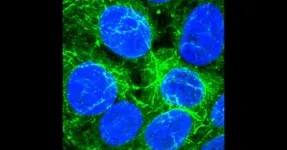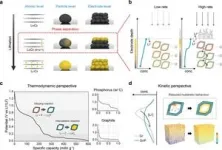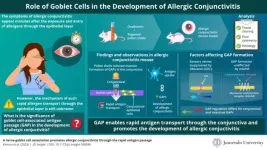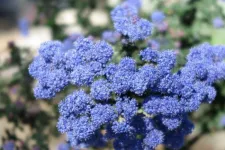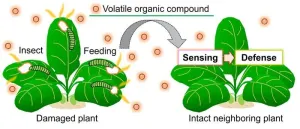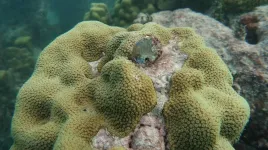(Press-News.org) Researchers at University of California San Diego have discovered a process in which liver cells share molecules via vesicle exchange in order to multiply under conditions that would ordinarily suppress cell proliferation. They also found evidence that this process occurs in various types of cancer cells, paving the way for a new approach to tackling treatment resistance in cancer. The findings were published on October 17, 2023 in eLife.
“Understanding cell proliferation is a fundamental issue in both cancer research and biomedical science as a whole,” said Gen-Sheng Feng, PhD, a professor of pathology at UC San Diego School of Medicine and of molecular biology at UC San Diego School of Biological Sciences. “While we studied the liver here because of its incredible regenerative potential, we’ve also found these vesicles in other types of cancer cells. We believe that this could be a universal mechanism that drives resistance to cancer therapies that target cell proliferation.”
The body has many molecular processes in place to help control cell proliferation, turning it on and off as necessary in different circumstances and in different organs. This is well-exemplified by the liver, which has a high capacity for regeneration to support its important detoxification and metabolic functions.
“Cells in the liver multiply more quickly and effectively than any other cells in the body, which makes the liver the ideal place to study the biological processes that control cell division,” said Feng. “These are the same processes that go awry in cancer, and so one promising approach to treating cancer is targeting cell proliferation.”
In previous research, Feng and his team observed that a minority of liver cells in mice could still proliferate even when the cells were genetically engineered to lack a critical signaling enzyme required for cell proliferation. This enzyme, called Shp2, helps liver cells know when it’s time to divide during liver regeneration. Shp2 is also a known target for treating various cancers, and Shp2 inhibitors are involved in several ongoing clinical trials.
The researchers discovered that liver cells have a clever way of compensating for the missing enzyme. By clustering together and exchanging tiny, protein-wrapped packages called vesicles, liver cells are able to communicate and share the biochemical materials needed to multiply, allowing them to proliferate even without Shp2.
“We’ve known for a long time that liver cells have other ways of regenerating even when lacking Shp2, and this study shows us how they do it,” said Feng.
While the researchers made the discovery in noncancerous liver cells, they also uncovered evidence that cancer cells may use the same strategy to resist treatment and continue to divide. The vesicles that liver cells use to share molecules are marked by a protein called CD133, and the researchers also detected abnormally high amounts of this protein in a variety of human cancer cells.
“We believe we’ve discovered an important strategy that tumors use to resist therapy,” said Feng. “This discovery could prove to be a powerful new target for cancer treatment, particularly as part of combination therapies to mitigate treatment resistance.”
While the findings could lead to the discovery of new cancer therapies, they also suggest a new way of thinking about cancer initiation, progression and recurrence. CD133 is widely viewed as a marker of cancer stem cells, groups of cancer cells that are thought to be responsible for initiating tumors.
“Our findings could tell us that a cancer cell’s ‘stemness,’ or ability to initiate and reinitiate tumors, isn’t a central part of its identity, but a temporary state that can be induced or possibly even turned off,” said Feng. “This could be a brand-new way of looking at tumor recurrence that could open doors for new treatments.”
Co-authors include: Kota Kaneko, Yan Liang, Qing Liu, Shuo Zhang, Alexander Scheiter and Dan Song, all at UC San Diego.
###
END
New cancer therapy target stops tumor cells from sharing resources
When times are tough, liver cells come together and share molecules needed to multiply; cancer cells may also do this to resist treatment
2023-10-17
ELSE PRESS RELEASES FROM THIS DATE:
International team reveals source of largest ever Mars quake
2023-10-17
A global team of scientists have announced the results of an unprecedented collaboration to search for the source of the largest ever seismic event recorded on Mars. The study, led by the University of Oxford, rules out a meteorite impact, suggesting instead that the quake was the result of enormous tectonic forces within Mars’ crust.
The quake, which had a magnitude of 4.7 and caused vibrations to reverberate through the planet for at least six hours, was recorded by NASA’s InSight lander on May 4 2022. ...
The dark side of the American lawn
2023-10-17
The American residential lawn is, for many, an iconic landscape and about half of homeowners in the US use fertilizer to keep their yards green and lush. Some proportion of the nitrogen in this fertilizer enters the broader environment, with negative consequences including algal blooms and deoxygenated waters. Peter Groffman and colleagues studied residential landscapes in the Baltimore, Maryland metropolitan area, which drains to the Chesapeake Bay, seeking to identify locations (hotspots) or times (hot moments) with disproportionately high rates of nitrogen export. The authors went to lawns in exurban, ...
New study sheds light on the developmental mechanism of allergic conjunctivitis
2023-10-17
When it comes to eye allergies, the transition from allergen contact to bothersome symptoms has always been quick, appearing within a span of a few minutes. The initial stage of allergic conjunctivitis involves the penetration of allergen through the epithelial cell layer (cells covering the outer surface of the body). However, the exact mechanism underlying the rapid allergen transfer has remained a mystery so far.
Fortunately, in a new ground-breaking study published in the journal JCI Insight on October 11, 2023, researchers from Juntendo ...
Western University researchers reveal link between Alzheimer’s and sex hormones
2023-10-17
LONDON, ON., CA:
Alzheimer’s disease disproportionately affects women, who represent about two-thirds of those diagnosed with the late-onset type of the disease.
Previous research has shown Alzheimer’s is also more severe and progresses more rapidly in women, and women with Alzheimer’s experience a steeper cognitive decline – loss of memory, attention, and the ability to communicate and make decisions – compared to men with the disease.
The biological bases for these differences between men and women with Alzheimer’s disease are not well understood. ...
How to help save plants from extinction
2023-10-17
Now is the time to identify the conditions that cause plants to die. Doing so will allow us to better protect plants by choosing conservation targets more strategically, UC Riverside botanists argue in a new paper.
Published in the Oxford Academic journal Conservation Physiology, the paper demonstrates how scientists can learn the limits past which plants’ vital functions shut down, and makes the case that not doing so is a mistake in this era of increasing drought and wildfires.
“We can measure the amount of water loss plants ...
Kennedy Krieger receives $5 million grant to expand reach of its pediatric post-COVID-19 clinic and support school students
2023-10-17
BALTIMORE, October 17, 2023—Researchers at Kennedy Krieger Institute have received a $5 million grant from the U.S. Department of Health and Human Services (HHS), through the Agency for Healthcare Research and Quality (AHRQ), to expand access to comprehensive care for children and adolescents with long COVID-19, particularly among underserved populations.
During the five-year project, researchers at the Pediatric Post-COVID-19 Rehabilitation Clinic will receive up to $1 million annually to expand and strengthen its integrative services in Baltimore and the overall mid-Atlantic ...
Can lifestyle interventions benefit patients with advanced breast cancer?
2023-10-17
MIAMI, FLORIDA (Oct. 17, 2023) – Can lifestyle interventions such as exercise and intermittent fasting help patients with advanced breast cancer better tolerate side effects from treatment?
That is the question Tracy Crane, PhD, RDN, and Carmen Calfa, MD, at Sylvester Comprehensive Cancer Center at the University of Miami Miller School of Medicine and their collaborators will strive to answer with a $4-million, five-year grant from the National Cancer Institute (NCI).
Crane, co-lead of Cancer Control and director of Lifestyle Medicine, Prevention and ...
Unlocking nature's silent conversations: Real-time visualization of plant-plant communications through airborne volatiles
2023-10-17
Saitama, Japan: Plants emit volatile organic compounds (VOCs) into the atmosphere upon mechanical damages or insect attacks. Undamaged neighboring plants sense the released VOCs as danger cues to activate defense responses against upcoming threats (Figure 1). This phenomenon of airborne communication among plants through VOCs was first documented in 1983 and has since been observed in more than 30 different plant species. However, the molecular mechanisms underlying VOC perception to defense induction remain unclear.
Unveiling the Invisible Conversation
The ...
Critical step made for managing brushtail possums
2023-10-17
Researchers say mapping the genetic code of the brushtail possum will benefit those working to both conserve and control the animal.
In a five-year long study, just published in Nature Communications, an international group of researchers led by the University of Otago, has assembled the entire genetic code of the marsupial mammal.
The work also uncovered where and when their genes are expressed, and revealed surprising details about their population diversity, reproduction, and origins.
Study lead Associate Professor Tim Hore, of Otago’s Department of Anatomy, describes possums as “a fascinating animal that is loved ...
Surprising discovery about coral’s resilience could help reefs survive climate change
2023-10-17
The factors affecting coral’s resilience — its ability to adapt to and survive environmental changes — seem to be more nuanced than scientists believed.
In a study published Oct. 18 in the journal Global Change Biology, researchers reveal surprising findings about a species common to Caribbean waters. The discovery may help improve efforts to save corals from bleaching and other consequences of climate change.
A team led by Assistant Professor of Biological Sciences Carly Kenkel at the USC Dornsife College of Letters, Arts and ...
LAST 30 PRESS RELEASES:
Kidney cancer study finds belzutifan plus pembrolizumab post-surgery helps patients at high risk for relapse stay cancer-free longer
Alkali cation effects in electrochemical carbon dioxide reduction
Test platforms for charging wireless cars now fit on a bench
$3 million NIH grant funds national study of Medicare Advantage’s benefit expansion into social supports
Amplified Sciences achieves CAP accreditation for cutting-edge diagnostic lab
Fred Hutch announces 12 recipients of the annual Harold M. Weintraub Graduate Student Award
Native forest litter helps rebuild soil life in post-mining landscapes
Mountain soils in arid regions may emit more greenhouse gas as climate shifts, new study finds
Pairing biochar with other soil amendments could unlock stronger gains in soil health
Why do we get a skip in our step when we’re happy? Thank dopamine
UC Irvine scientists uncover cellular mechanism behind muscle repair
Platform to map living brain noninvasively takes next big step
Stress-testing the Cascadia Subduction Zone reveals variability that could impact how earthquakes spread
We may be underestimating the true carbon cost of northern wildfires
Blood test predicts which bladder cancer patients may safely skip surgery
Kennesaw State's Vijay Anand honored as National Academy of Inventors Senior Member
Recovery from whaling reveals the role of age in Humpback reproduction
Can the canny tick help prevent disease like MS and cancer?
Newcomer children show lower rates of emergency department use for non‑urgent conditions, study finds
Cognitive and neuropsychiatric function in former American football players
From trash to climate tech: rubber gloves find new life as carbon capturers materials
A step towards needed treatments for hantaviruses in new molecular map
Boys are more motivated, while girls are more compassionate?
Study identifies opposing roles for IL6 and IL6R in long-term mortality
AI accurately spots medical disorder from privacy-conscious hand images
Transient Pauli blocking for broadband ultrafast optical switching
Political polarization can spur CO2 emissions, stymie climate action
Researchers develop new strategy for improving inverted perovskite solar cells
Yes! The role of YAP and CTGF as potential therapeutic targets for preventing severe liver disease
Pancreatic cancer may begin hiding from the immune system earlier than we thought
[Press-News.org] New cancer therapy target stops tumor cells from sharing resourcesWhen times are tough, liver cells come together and share molecules needed to multiply; cancer cells may also do this to resist treatment
